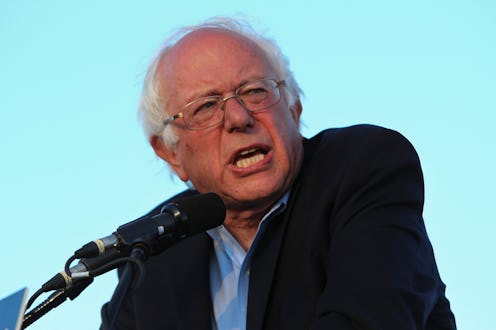News
What's Up With Sanders' Superdelegate Argument?
Early on in the Democratic primary race, supporters of Sen. Bernie Sanders were decrying the superdelegate system as a way of undermining the will of the people, with Sanders himself speaking out against their status as free agents. Superdelegates are not bound to vote according to the results of primaries or caucuses. A majority of the superdelegates expressed support for Hillary Clinton before voting even began, and Sanders and his supporters have said that they should take into consideration how the people vote when making their decisions at the convention. But now, Sanders intends to win over superdelegates, even if he doesn't win the popular vote or pledged delegate count. What's up with that?
Sanders and his campaign have been pushing this angle since March, and they aren't letting up. In a statement responding to Associated Press's declaration of Clinton as the Democratic Party's presumptive presidential nominee ahead of the crucial June 7 primaries, the campaign said:
Secretary Clinton does not have and will not have the requisite number of pledged delegates to secure the nomination. She will be dependent on superdelegates who do not vote until July 25 and who can change their minds between now and then ... Our job from now until the convention is to convince those superdelegates that Bernie is by far the strongest candidate against Donald Trump.
Superdelegates were created by the Democratic Party to help ensure that the party nominates the candidate most likely to win in the general election. In that regard, Sanders' mission is in line with their purpose. However, it seems hypocritical to decry that system, only to turn to it when he is down on pledged delegates. Does Sanders have an argument here?
Sanders has responded to this criticism in a couple of different ways. Toward the end of May, he told Chuck Todd in an interview:
When you have a situation where 400 superdelegates came on board Clinton's campaign before anybody else was in the race, eight months before the first vote was cast — that's not rigged, it's just a dumb process which has certainly disadvantaged our campaign.
The argument here seems to be that one of the reasons Sanders is behind in the popular vote is that the superdelegates backing Clinton so early on gave her nomination an aura of inevitability, and made his run seem futile. That may have discouraged voters from getting to know him and showing up at the polls for him. If that's the case, it is perhaps reasonable to expect some of them to reverse the damage done if they see the momentum his campaign picked up throughout the primary — momentum is another factor Sanders highlighted in his interview with Todd.
Sanders offered another explanation at a rally on April 26:
The reason that we are doing so much better against Republican candidates is that not only are we winning the overwhelming majority of Democratic votes, but we are winning independent votes and some Republican votes as well. And that is a point I hope the delegates to the Democratic Convention fully understand. In a general election, everyone — Democrat, independent, Republican — has the right to vote for president.
Sanders was obviously off on the "winning the overwhelming majority of Democratic votes" front, but his point about the independent vote is solid, as exit poll after exit poll shows him as the clear favorite among that demographic. Sanders has spoken out against how closed primaries prevent independents from participating in the nomination process. Sure, people could change their affiliation by their states' deadlines and vote in closed primaries, but not everyone knows to do so. New York's deadline to change party affiliation was way back in October, which stoked the ire of Sanders supporters in the state's April 19 primary.
So the argument here seems to be that, since many independents might not have gotten to vote in the primaries, and they probably would have voted for Sanders if they could have, the results of the primaries as a whole don't necessarily reflect the will of the people.
Sanders' arguments for trying to win over superdelegates even if he doesn't win the popular vote are based on speculation concerning the impact of superdelegates' early expressed support for Clinton on his campaign, and how many independents who would have voted for him were exempted from the primary process. Whether that sits well with his supporters is for them to decide.
